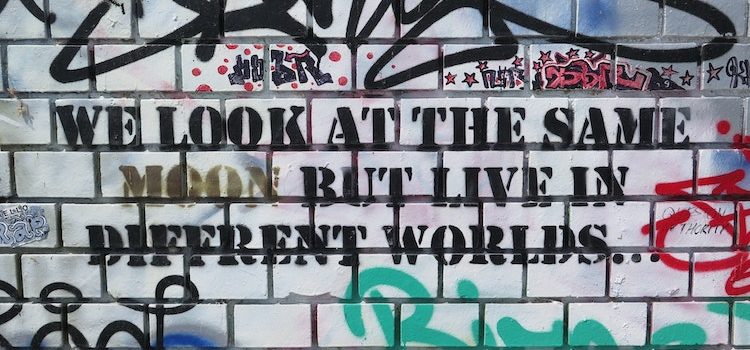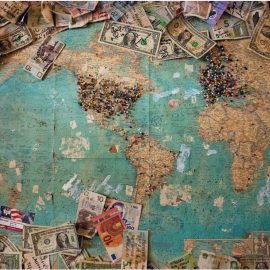

This article is an excerpt from the Shortform book guide to "The Righteous Mind" by Jonathan Haidt. Shortform has the world's best summaries and analyses of books you should be reading.
Like this article? Sign up for a free trial here .
Why do different societies have different moral codes? Why is a certain behavior “good“ here—but “bad“ over there?
Jonathan Haidt, in his book The Righteous Mind, argues that morality is culture-dependent—that different societies have different moral codes. Studying people in Philadelphia and Brazil, he found that even groups within societies have different moralities from one another.
Read more to learn why different societies have different moral codes.
Different Morals in Different Places
According to the theories of rationalism, kids figure out and understand morality on their own, through reason. Children who are able to make choices for themselves develop a morality that’s centered around reducing harm—if an action doesn’t cause harm, it’s not immoral. This argument has some merit if we’re considering only the secular West. (We’ll call the secular Westerners WEIRD: Western, educated, industrialized, rich, and democratic.) For well-educated, secular Westerners, ethics does center around the “harm principle,” introduced by John Stuart Mill in 1859: The only way that anyone should exercise power in a civilized society is to prevent harm. But this doesn’t explain why different societies have different moral codes.
To study if morality extends beyond harm, we must know whether people would condemn actions they thought weren’t harmful. So Jonathan Haidt set out to write that study himself, coming up with “harmless taboo violations.” With Brazilian academic Silvia Koller, they conducted the study across social class and culture in Brazil (they used differently educated people from two different cities). In addition, they used Philadelphia for the Western, secular case.
In Philadelphia, it was clear that the Americans made a distinction between a moral wrong and a social/conventional violation. The upper-class Brazilians agreed with the Americans. But the lower class Brazilian kids did not, and argued, for example, that it was a moral wrong not to wear a mandated uniform to school.
Different societies have different moral codes. Even groups within societies have different moralities from one another. However, particularly if you’re living in a non-WEIRD society, your morality is likely to be more expansive than just preventing harm and ensuring fairness.
The 3 Types of Ethical Codes
Ethical concerns around the world, including in non-WEIRD places, are clustered in three major bunches, according to cultural anthropologist Richard Shweder.
- The ethic of autonomy: This is the concept that people are individuals who have their own, autonomous wants and needs. Societies develop “rights” like the right to liberty and justice in order to allow people to pursue their own individual wishes. This is the dominant ethic, as you might expect, in an individualistic society. Along with the harm principle, the ethic of autonomy is the foundation of morality in WEIRD societies. But there are two other ethics that are strong around the world, and it helps explain why different societies have different moral codes.
- The ethic of community: This is the idea that people are first part of a group—a family, nation, team, company, and so on. These entities are important beyond the people who make them up. Moral concepts like duty, respect, and hierarchy are essential to this ethic. The idea that people should design their own lives is actively dangerous to the group and will weaken the social fabric.
- The ethic of divinity: This is the idea that people are simply vessels of a divine soul. They are God’s creations, and the intent of honoring God should guide their behavior. According to this ethic, sex with a dead chicken is morally wrong not because it hurts the community or the individual, but because it dishonors the creator and violates the universe. The concepts of purity, sanctity, pollution, degradation, and elevation are particularly important in this ethic. People who believe in this ethic view the personal liberties in Western nations as libertinism, because they often conflict with more orthodox religious teachings.
Haidt himself learned that, while different societies have different moral codes (and we are stuck in our own bubbles of morality most of the time), it’s actually not that hard to see other ethical foundations in action and appreciate them.
Despite knowing and understanding these systems in the abstract, when Haidt went to study in India, he felt his own identity—that of a liberal atheist—come into conflict with what he was experiencing. He had meals in houses where wives would serve him silently and retreat back to the kitchen, and he watched people cook and bathe in water that was called sacred but was obviously polluted. However, after a few weeks, natural empathy kicked in, and since he liked the people he was around, it was easier to understand their perspective. The ethics were simply different, and he found some beauty in these different moral codes.
When he returned to Chicago, he began to feel that certain objects radiated a degree of “positive essence.” For instance, it didn’t feel right to bring certain books to the bathroom. Haidt also found he could listen to social conservatives with more of a clinical detachment and understand that they were existing on a different matrix. It then began to make sense to Haidt why the American culture wars were so concerned with sacrilege. What is a flag—a piece of cloth or a symbol of our greatness as a nation, infused with divinity? Does the existence of artwork defaming the church make our world dirtier? Many Americans saw national symbols and religious institutions as sacred and attempts to destroy them as immoral. Haidt, who grew up only understanding the ethic of autonomy, began to empathize with people whose ethics were centered around community and divinity.
Many different moral matrices—or moralities formed from the ethical codes of autonomy, community, and divinity—exist within every nation. Each provides a complete worldview, and each is almost impossible to attack from the outside. Based on the environment in which we grow up, there are different matrices imbued within us from early childhood.
People can change—someone raised in a society that’s concerned with ethics of autonomy can understand and start to believe in ethics of community and the converse can happen as well—but usually we maintain our moral matrices throughout our lives.
Realizing that different societies have different moral codes can help us understand our world and each other better.

———End of Preview———
Like what you just read? Read the rest of the world's best book summary and analysis of Jonathan Haidt's "The Righteous Mind" at Shortform .
Here's what you'll find in our full The Righteous Mind summary :
- Why we all can't get along
- How our divergent moralities evolved
- How we can counter our natural self-righteousness to decrease political divides






